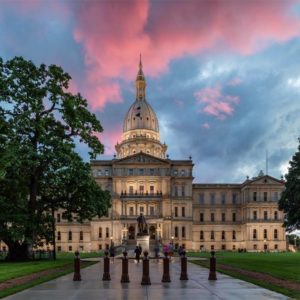By Paul Rozycki
The combined December/January issue of the East Village Magazine marks the end of one year and the beginning of another, and gives us the opportunity to take a look back at what mattered in 2022 — and to look forward to what might matter in 2023.
Looking back: The national level
Politically, the year 2022 was a year of surprises. The first midterm election after a presidential election is almost always bad news for the party in the White House, and most observers expected that to be the case in the past year. Nearly everyone expected the Republicans to gain as many as 30 or more seats in the U.S. House, gain a majority in the U.S. Senate, and do equally well in other races around the country.
That wasn’t the case. Democrats surprised almost everyone by hanging on to the Senate, losing the House narrowly, and winning the Michigan governorship, secretary of state, attorney general and winning a majority in both the state House and the state Senate for the first time in nearly 40 years.

Michigan State Capitol building in Lansing. (Photo source: Michigan State Capitol Facebook page)
It seems to have happened for two major reasons. When the U.S. Supreme Court overturned the Roe v. Wade decision earlier in the year, potentially denying women the right to an abortion, it energized many voters who often sit out mid-term elections. The Democrats made abortion a major campaign issue and it was key to mobilizing independent, suburban women — who often give Republicans an advantage in midterms.
The second reason why Democrats did well was the division within the Republican Party — between traditional Republicans and the Trump wing of the party. Trump’s endorsement won the nomination for many of his election-denying candidates, but many of the Trump-backed candidates proved unable to reach beyond their own Trump base and mobilize a larger part of the Republican Party, much less independents and Democrats. Many traditional Republican fundraisers and donors decided to stay on the sidelines for this election.
Looking ahead: The national level
In the year ahead, will the Republican Party become the party of Trump, or will it find a way to break his hold on the party and return to its traditional roots? Trump has already announced he is running for president in 2024, and more than a few challengers are already on the horizon. Will his latest nutty claim to suspend the Constitution cost him any of his supporters? Will his lunch dates with anti-Semites and white supremacists? If it’s Trump against one or two other Republican candidates, he will likely lose, but if it’s Trump against a dozen other candidates he could still emerge on top as he did in 2016.
The other question is, will Joe Biden run again? There have been doubts voiced by some in his own party, but his recent move to make South Carolina and Michigan among the first primary states suggests he might be a candidate in 2024. Will Biden face a serious challenge if he runs?

President-elect Joe Biden outside Berston Field House in Flint during a 2019 Campaign stop. (Photo by Paul Rozycki)
What role will the new Republican House play? Will they be willing to work with President Biden and the Democratic Senate, or will they pursue investigations of the 2020 election, Hunter Biden’s laptop, or launch attempts to impeach Democratic officials. Will anything more be heard about the Jan. 6 committee hearings?
Looking back: The state
It wasn’t a huge surprise that Gov. Gretchen Whitmer, Secretary of State Jocelyn Benson, and Attorney General Dana Nessel won their contests. Most polls gave them a significant lead and their Trump-backed opponents were underfunded and tied to various election-denying conspiracies. What was significant was the Democrats taking the majority in the state House and the state Senate for the first time in decades. In addition to the issues mentioned earlier, the non-partisan districts created by Michigan’s independent commission played a role, giving the Democrats a chance to take the majority in the legislature.

Gov. Gretchen Whitmer (Photo by Tom Travis)
Looking ahead: The state
Now that they will hold the majority in the state government, will the Democrats be able to deliver on their promises of economic growth, abortion protection, and working across the aisle? It may work, but more than a few governors have faced conflicts from their own parties when they had the majority in the legislature.
Looking back: The proposals
In 2022 voters in Michigan approved three amendments to the state Constitution by substantial margins. Proposal 1 changed the term limits for state lawmakers. Proposal 2 reformed and changed our voting process, assuring easier access to voting. Proposal 3 guaranteed a women’s right to an abortion and repealed a 1931 law that criminalized the procedure.

Roe v. Wade protest, Genesee County Court House. (Photo by Tom Travis)
Looking ahead: The proposals
Proposal 1: In the next year we will likely see lawmakers change their career plans as they adapt to the new term limits, allowing them to stay in either the state Senate or the state House for up to 12 years. Will it mean more experienced lawmakers in Lansing?
Proposal 2: We will see local election officials make attempts to allow for nine days of early voting and they may need to find additional funds to adapt to those changes. Legislation may be needed to smooth the process of several of the new voting rules.
Proposal 3: There may be lawsuits over the full reach and extent of Proposal 3, particularly which laws are repealed and which are not.
Looking back and looking ahead: The local level
In 2022 three major issues set the stage for next year on the local level—the Flint mayoral race, the Flint Community School Board election, and the future of the U of M-Flint.
The Flint mayoral race
Mayor Sheldon Neeley won his second term over former Mayor Karen Weaver, with a larger margin than the 205 votes he had the last time they ran against each other.
Looking forward, will that victory make it easier for him to work with a city council that has often been an adversary to the mayor’s office? Will the mayor and council produce a workable budget for the city? Will the personnel changes in City Hall make for less conflict? It remains to be seen, but East Village Magazine and Tom Travis will be there, covering the story.
The Flint Community School Board
Perhaps the biggest change locally was the election of five new members to the Flint Community School Board. Over the past year, the Flint board had been consumed with conflict and contention as they tried to rebuild a school system that was once the pride of the nation and now faces plummeting enrollments, decaying buildings, and loss of staff.

Flint Community School administration building in the Flint Cultural Center. (Photo by Tom Travis)
Looking forward, the hope is that the five new members will bring stability and teamwork to a board that needs all the support it can get as it aims to restore and rebuild the Flint Community Schools. As he has covered the conflict in the Flint School Board, Harold Ford and East Village Magazine will cover the new board as it tries to restore some sense of harmony to the body and rebuild the Flint Community Schools.
The future of the U of M-Flint
Looking back the year 2022 also brought an ominous threat to another major educational institution—the University of Michigan-Flint. In a series of meetings and declarations the Ann Arbor Board of Regents said that the University of Michigan-Flint would need to make major changes in its curriculum and its outreach to students if it is to survive, improve enrollment, and be financially viable. Protests and demonstrations were held on campus. The reactions ranged from the threat of closing the Flint university altogether to fear that the traditional liberal arts curriculum would be replaced by occupational STEM-based programs.
Looking forward, there are many meetings and hearings scheduled on the future of the UM-Flint, and it is certain to be a major topic of 2023 and a major story for East Village Magazine. Jan Worth-Nelson and Harold Ford will cover the developing changes. At stake is the future of the UM-Flint campus, the nature of its curriculum, and its impact on Flint.
In the end, if 2023 is anything like 2022, it will be a year of surprises.
EVM political writer and commentator Paul Rozycki can be reached at paul.rozycki@mcc.edu.


You must be logged in to post a comment.